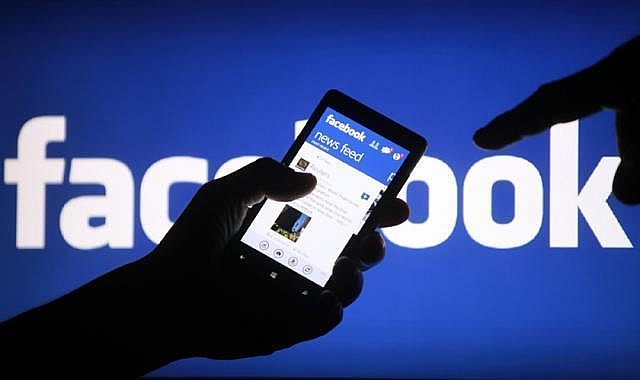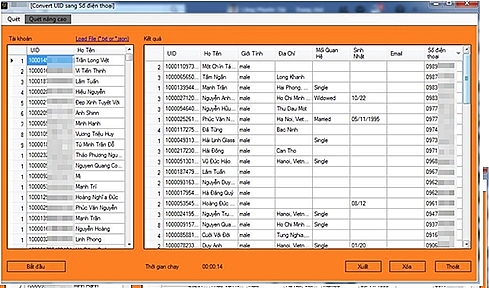Facebook user data is publicly offered in Vietnam
 |
| Facebook user data has long been sold in Vietnam |
The information on sale includes names, telephone numbers, email addresses, home addresses, hobbies, and the interests of Facebook users.
Pham Van Hoi, manager of a media company in Hanoi, said, “Facebook user data has long stopped being private.” A dozens of computer applications were created by developers to scan Facebook User ID (UID) to get related information.
UID is similar to the identification number (ID) that Facebook gives to users and it is also the only way to identify a person. Through UID, scanning tools can access the data store for retrieving a person’s name, date of birth, gender, address, and even that person’s public friend list, then save it in an Excel file.
 |
| A tool allowed to get the information of Facebook users |
Hoi also said that before June 2015 Facebook allowed ads to run directly with UID, which means that advertisers could target customers with greater accuracy.
However, later the social network has stopped these kinds of ads, but they still indirectly run via phone or email (except the address of @facebook.com). Therefore, with some converters, Facebook users’ data can be used for marketing purposes.
| With monthly subscription fees going from hundreds to several millions of VND, the application can filter Facebook users’ private data for many different purposes. |
Previously in early 2018, according to newswire The Guardian, a campaign organising company named Cambridge Analytica was allegedly mining personal information of 50 million Facebook users for the sake of its clients’ advertising campaigns, which shockingly included the firm’s latest client, US President Donald Trump’s presidential election campaign.
Expressing remorse over the scandal, Mark Zuckerberg, CEO and founder of Facebook, said, “This is a violation of trust” and “I am happy to testify if it is the right thing to do,” in an exclusive interview on Anderson Cooper 360, according to newswire CNN.
In 2013, the multinational firm made an official announcement that the personal account data of six million users were manipulated due to a security bug, causing tremendous worries among users.
Particularly, the bug revealed the email addresses and home telephone numbers of a significant number of users, threatening to provide such personal information to developers and advertisers.
Previously in 2009, the IT giant was also caught up in a security scandal where the private profile information of its users was exposed thanks to amateur bloggers’ hacking tricks. Specifically, all details listed in a Facebook user’s “basic information” panel could be exposed to whoever showed interests in using such information for business purposes.
Regardless of the privacy settings, precious information such as name, date of birth, workplace, and even family members’ personal data could be bared to the public. Additionally, the security vulnerability wreaked havoc among influential people, especially public figures like celebrities, since their sensitive details such as personal messages, privately shared photographs, and even their whereabouts, using their GPS locations, could benefit individuals with malicious intentions, such as paparazzi and obsessive stalkers.
What the stars mean:
★ Poor ★ ★ Promising ★★★ Good ★★★★ Very good ★★★★★ Exceptional
Related Contents
Latest News
More News
- Japanese business outlook in Vietnam turns more optimistic (January 28, 2026 | 09:54)
- Foreign leaders extend congratulations to Party General Secretary To Lam (January 25, 2026 | 10:01)
- 14th National Party Congress wraps up with success (January 25, 2026 | 09:49)
- Congratulations from VFF Central Committee's int’l partners to 14th National Party Congress (January 25, 2026 | 09:46)
- 14th Party Central Committee unanimously elects To Lam as General Secretary (January 23, 2026 | 16:22)
- Worldwide congratulations underscore confidence in Vietnam’s 14th Party Congress (January 23, 2026 | 09:02)
- Political parties, organisations, int’l friends send congratulations to 14th National Party Congress (January 22, 2026 | 09:33)
- Press release on second working day of 14th National Party Congress (January 22, 2026 | 09:19)
- 14th National Party Congress: Japanese media highlight Vietnam’s growth targets (January 21, 2026 | 09:46)
- 14th National Party Congress: Driving force for Vietnam to continue renewal, innovation, breakthroughs (January 21, 2026 | 09:42)

 Tag:
Tag:























 Mobile Version
Mobile Version